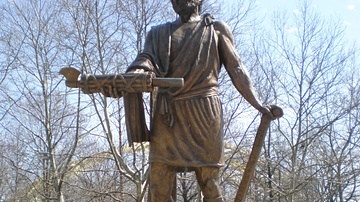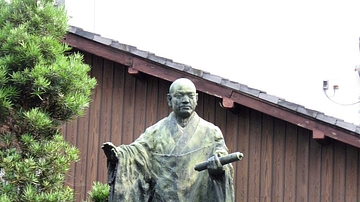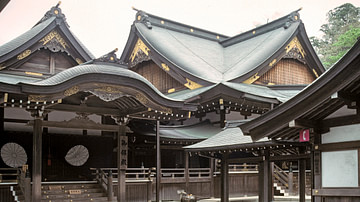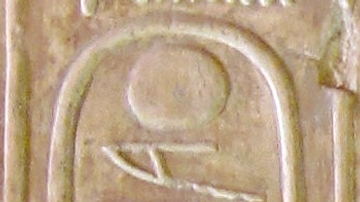Search Images
Browse Content (p. 1402)

Image
Cincinnatus
Statue of Cincinnatus in Cincinnati, Ohio.

Image
Mount Fuji, Aerial View
Mount Fuji, Japan's highest mountain and a place of pilgrimage for followers of Shinto.

Image
Nichiren
A statue of Nichiren outside Honnoji temple on Teramachi.

Image
Dharma Wheel
The Dharmachakra (Skt: wheel of the law with eight spokes) represents the Eightfold Path (Right View, Right Resolve, Right Speech, Right Actions, Right Occupation, Right Effort, Right Mindfulness, and Right Concentration). Konark Sun temple...

Image
East Asia in 500 CE
This map shows the territories of all major civilizations in East Asia in the year 500 CE. Italicized texts indicate nomadic bands or tribal societies.

Image
Major Temples and Shrines of Japan circa 1200 CE, Kamakura Shogunate
This map depicts all major Buddhist temples and Shinto shrines of Japan around the year 1200 CE. Notice that many renowned temples (such as the famous Kinkaju-ji) have not yet been built at that time. The map highlights the city of Kamakura...

Image
Kaguraden at the Ise Grand Shrine
The kaguraden or dancing hall at the Ise Shinto shrine dedicated to Amaterasu. The site first had a shrine built in 4 BCE and is Japan's oldest Shinto shrine, as well as its most important.

Image
Torri, Itsukushima Shrine
The Torri at the Itsukushima Shrine, Hatsukaichi, Hiroshima Prefecture, Japan.

Image
Egypt's Sixth Dynasty Kings
The kings of Egypt's 6th Dynasty from the Abydos King List.

Image
Cartouche of Merenre Nemtyemsaf II
The cartouche of Merenre Nemtyemsaf II, from the Abydos King List, Temple of Seti I, Abydos, Egypt